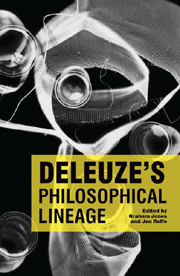Book contents
- Frontmatter
- Contents
- Acknowledgements
- List of Abbreviations
- Introduction: Into the Labyrinth
- 1 Plato
- 2 John Duns Scotus
- 3 G. W. F. Leibniz
- 4 David Hume
- 5 Immanuel Kant
- 6 Solomon Maimon
- 7 G. W. F. Hegel
- 8 Karl Marx
- 9 Hoëne Wronski and Francis Warrain
- 10 Bernhard Riemann
- 11 Gabriel Tarde
- 12 Sigmund Freud
- 13 Henri Bergson
- 14 Edmund Husserl
- 15 A. N. Whitehead
- 16 Raymond Ruyer
- 17 Martin Heidegger
- 18 Pierre Klossowski
- 19 Albert Lautman
- 20 Gilbert Simondon
- Bibliography
- Notes on Contributors
- Index
12 - Sigmund Freud
Published online by Cambridge University Press: 12 September 2012
- Frontmatter
- Contents
- Acknowledgements
- List of Abbreviations
- Introduction: Into the Labyrinth
- 1 Plato
- 2 John Duns Scotus
- 3 G. W. F. Leibniz
- 4 David Hume
- 5 Immanuel Kant
- 6 Solomon Maimon
- 7 G. W. F. Hegel
- 8 Karl Marx
- 9 Hoëne Wronski and Francis Warrain
- 10 Bernhard Riemann
- 11 Gabriel Tarde
- 12 Sigmund Freud
- 13 Henri Bergson
- 14 Edmund Husserl
- 15 A. N. Whitehead
- 16 Raymond Ruyer
- 17 Martin Heidegger
- 18 Pierre Klossowski
- 19 Albert Lautman
- 20 Gilbert Simondon
- Bibliography
- Notes on Contributors
- Index
Summary
In the 1960s, French interest in Freud increased dramatically, in large part due to the teachings of Jacques Lacan, whose seminars on Freud and psychoanalysis had been drawing a growing body of adherents since their inception in 1953. With the publication of Lacan's Ecrits in 1966 that interest redoubled, and by the end of the decade a veritable ‘psychoanalytic culture’ had begun to take shape in France. Like many of his contemporaries, Deleuze was intrigued with the possibilities offered by Freud for the creative reconfiguration of philosophical issues, and in Masochism: Coldness and Cruelty (1967), Difference and Repetition (1968), and The Logic of Sense (1968) Deleuze took up several Freudian concepts and gave them a prominent position in his thought. After May '68, however, Deleuze began a collaboration with Félix Guattari, a Lacanian psychoanalyst and activist in the antipsychiatry movement, and in 1972 the two of them produced Anti-Oedipus: Capitalism and Schizophrenia, a thoroughgoing critique of Freud and the Freudian tradition of psychoanalysis. Save for a chapter of Kafka: Toward a Minor Literature (1975), a short section of A Thousand Plateaus (1980), and a few brief papers in Essays Critical and Clinical (1993), Deleuze made little mention of Freud in his subsequent writings. Despite this silence, however, the influence of Freud remained in his work, for whatever the shortcomings Deleuze saw in Freud and the Freudian psychoanalytic movement, they provided him with the key insight that desire and the unconscious are fundamental constituents of thought.
- Type
- Chapter
- Information
- Deleuze's Philosophical Lineage , pp. 219 - 236Publisher: Edinburgh University PressPrint publication year: 2009



